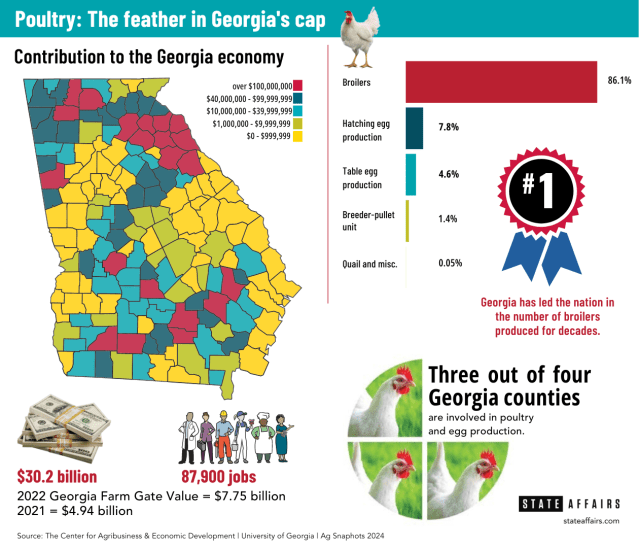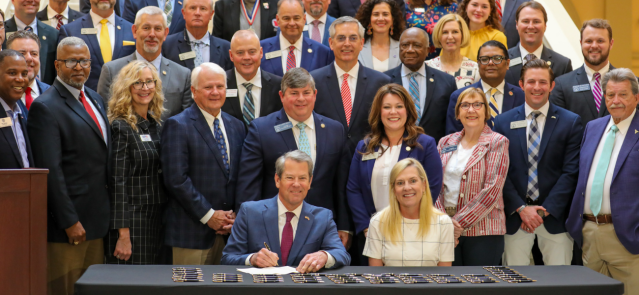Stay ahead of the curve as a political insider with deep policy analysis, daily briefings and policy-shaping tools.
Request a Demo
Credit: Alessandro Marazzi Sassoon (State Affairs)
- Georgia voters will choose once again between Brian Kemp and Stacey Abrams to become governor.
- High early-voting turnout before the primary helped curb the hours-long lines and wait times seen in past Georgia elections.
- Hundreds of thousands more ballots were cast in the Republican primary for governor than on the Democratic side.
The Gist
Georgians flocked to the polls in record-breaking numbers for the 2022 primary elections. Battle lines have been drawn in several key races. Others head to runoffs in June.
What’s Happening
Georgia held primaries on Tuesday to decide the nominees for key statewide offices in Georgia including governor, secretary of state and U.S. Senate. Many of those races drew fierce competition from challengers aiming to unseat incumbents within their own party.
After a record-setting 2 million ballots were cast yesterday, runoffs are ahead for Democratic voters to decide who will compete for Georgia’s lieutenant governor and secretary of state, both of which are top statewide offices. Primary runoffs are set for June 21.

Click the image above to read State Affairs' story on who's headed to the general election and who's headed for a primary runoff in the 2022 races. (Credit: Brittney Phan for State Affairs)
Democratic State Rep. Bee Nguyen (D-Atlanta) failed to gain the 50% vote margin needed to avoid a runoff for secretary of state. Former Atlanta City Councilman Kwanza Hall, a Democrat, also heads to a primary runoff for lieutenant governor.
Elsewhere, Democratic candidates will also face runoffs in the primary races for labor and insurance commissioners.
Kemp vs. Abrams 2.0
Once again, Georgia voters will choose between Brian Kemp and Stacey Abrams to become governor. The difference this year: Democratic office-seekers have made more headway in Georgia than Kemp and Abrams’ last matchup in 2018.
Kemp, a Republican, edged out Abrams, a Democrat, by less than 55,000 votes four years ago. The close margin fueled state Democratic leaders’ push to flip U.S. Senate seats long held by Republicans and Georgia’s presidential pick in 2020.

Gov. Brian Kemp speaks to supporters in Atlanta after winning the 2022 Republican primary for governor on May 24, 2022. (Credit: Alessandro Marazzi Sassoon for State Affairs)
Expect a big media blitz with mud slinging from both campaigns to start in coming weeks.
In his victory speech, Kemp accused Abrams of using her campaigns for governor to raise her profile in preparation for a future run for president. Abrams has denied interest in running for president.
“Unfortunately for Stacey Abrams, the people of our state aren’t going to be used as a stepping stone to the White House,” Kemps said. “We’re going to make sure that Stacey Abrams’ road to Pennsylvania Avenue stops right here in the Peach State.”

Democratic gubernatorial nominee Stacey Abrams rallies supporters in Atlanta amid primary voting on May 24, 2022. (Credit: Alessandro Marazzi Sassoon for State Affairs)
Shortly after, Abrams slammed Kemp for signing a bill to allow concealed-carry guns with permits in Georgia. Her comments came amid news that a gunman killed 19 elementary school students and two adults at a Texas school.
“Kemp disqualified himself when he pushed a criminal carry bill that will put more guns on our streets and make us less safe. … Years from now, Kemp will be remembered as a one-term governor who pointed a gun at a boy on television,” Abrams said in a news release, referring to Kemp’s 2018 campaign ad in which he pointed a shotgun in the direction of a young man.
The Rise of Early Voting
More than 860,000 ballots were cast in three weeks of early voting ahead of Tuesday’s primary, nearly triple the number cast early in the 2018 midterms. High early-voting turnout before Tuesday’s primary helped curb the hours-long lines and wait times seen in past Georgia elections, officials said.
Voters across the state largely breezed through polling places Tuesday. "I was expecting more people," said LaTosha Beadles, a 53-year-old life insurance processor who voted in Fulton County, where many voters waited in line for six hours in the 2020 primaries.

Click the photo above to read State Affairs' story on how voting went during Primary Day on May 24, 2022. (Credit: Alessandro Marazzi Sassoon for State Affairs)
The 2022 primaries marked the most votes ever cast in a midterm primary election thanks largely to strong early-voting turnout, said Charles Bullock, a University of Georgia political science professor.
“I think we’ll see more and more of that,” Bullock said about early voting. “People like the latitude it gives them.”
Meanwhile, around 75,000 absentee ballots were cast in the Republican and Democratic primaries for governor, higher than the roughly 18,000 mail-in ballots cast in the 2018 primary but far less than the 1.3 million cast in the 2020 presidential election.
Voting-rights advocates say tighter ID rules and shorter request deadlines passed last year have caused doubts that mail-in voters will have their ballots counted, prompting a pivot to more Georgians going to the polls in person.
GOP Wins Turnout
Far more ballots came in for Republican primaries on Tuesday than the opposing party, indicating Democratic nominees have their work cut out for them if they hope to flip top seats like governor and secretary of state in November.
More than 480,000 more ballots were cast in the Republican primary for governor than on the Democratic side – roundly out to roughly double the number of Republican primary ballots than Democratic.

Click the image above to read State Affairs' story on the ballot casting and vote counting for Georgia's primary elections on May 24, 2022. (Credit: Alessandro Marazzi Sassoon for State Affairs)
The highly charged race between Kemp and his main primary challenger, former U.S. Sen. David Perdue, drove high interest among Republican voters – compared to the Democratic primary featuring Abrams who ran unopposed, said UGA’s Bullock.
Also, election experts are analyzing whether thousands of Democratic voters pulled Republican primary ballots in order to weaken chances for Trump-baked challengers to win their party’s nomination.
Nearly 10% of Republican ballots in Fulton County were likely cast by Democratic voters, said Bullock. That cross-party voting may have given incumbent Secretary of State Brad Raffensperger the needed boost to avoid a runoff over his Trump-backed Republican, U.S. Rep. Jody Hice, Bullock said.
“It may result in swinging at least one contest,” Bullock said. “If indeed it did save Raffensperger, that’s pretty significant.”
What’s Next?
Georgia’s race for governor will continue to be the focus of national attention between now and November, given the close split between Kemp and Abrams in 2018. Other competitive races including for secretary of state, lieutenant governor and U.S. Senate are also expected to drive huge turnout in the general election.
Early voting for the primary runoffs starts no later than June 13. The last day to request an absentee ballot is June 10. Only those who were registered to vote in Tuesday’s primaries may vote in the runoffs.
The general election is set for November 8. Three weeks of early voting will start on October 17. The last day to register to vote in the general election is November 7.
Join the Conversation
What else do you want to know about Georgia’s elections and state government? Share your thoughts/tips by emailing [email protected] and [email protected].
Read this story for free.
Create AccountRead this story for free
By submitting your information, you agree to the Terms of Service and acknowledge our Privacy Policy.
Global bird flu disrupts Georgia exports, costing chicken producers millions
ATLANTA — A global bird flu that has rapidly spread from birds to dairy cows, milk supplies and humans has cost untold millions of dollars in lost export business in Georgia, the nation’s leading poultry producer, officials with the state Department of Agriculture and poultry industry said.
Georgia has had only three reported cases of H5N1 avian influenza since it reemerged in 2022. The last of those cases was resolved in November 2023 but ramifications of those outbreaks continue to have a big effect on the state’s ability to export chicken and chicken parts, such as chicken feet, to different countries, including China, one of Georgia’s biggest export markets for chicken feet.
In 2022, frozen chicken feet, for example, accounted for more than 85% of all U.S. poultry exported to China, according to Farm Progress, publisher of 22 farming and ranching magazines.
The $30 billion poultry industry is Georgia’s largest segment in its No. 1 industry — agriculture.

China has also placed a ban on the import of chicken products from 41 other American states. The ban on Georgia products went into effect Nov. 21, 2023. Efforts to reach the Chinese Embassy in Washington, D.C. were unsuccessful.
Georgia Poultry Federation President Mike Giles estimates the state’s loss at “well into the millions of dollars.”
“It’s a significant amount in a significant export market for us,” he said. “Poultry paws [feet] immediately lose value because of the loss of demand.”
The ban has forced Georgia poultry producers to find alternative markets for their products that would normally be headed to China.
“Some are sold domestically, some are frozen and stored, hopefully to find markets later on, and some go to other countries,” Giles said.
This isn’t the first time China has banned U.S.-produced poultry products due to a bird flu outbreak. The country instituted a ban in January 2015 which lasted until November 2019 — even though U.S. poultry products were deemed free of the disease by August 2017.
After that ban was lifted, China’s appetite for American-produced chicken products became voracious.
In 2022, U.S. producers shipped nearly $6 billion in poultry meat and related products (excluding eggs) to over 130 countries. China has emerged as the second largest destination for U.S. poultry exports, increasing from $10 million in 2019 to a record $1.1 billion in 2022, according to Southern Ag Today.
Chicken paws, for instance, are eaten in many Asian countries, including the Philippines, Thailand, Indonesia and Korea.They can also be found on Chinese dim sum menus throughout the U.S. and are also popular in Jamaica, Trinidad, Russia and Ukraine in everything from soups and curries to fried snacks.
Three Georgia counties have reported H5N1 outbreaks since 2022. The most recent case was late last year. Henry, Sumter and Toombs counties each reported one case of H5N1 bird flu. Those outbreaks are resolved, poultry and state agriculture officials say.
“When HPAI cases are found in any state, that state is given a designation that could lead to foreign countries halting trade on poultry products from that state,” Georgia Department of Agriculture spokesman Matthew Agvent told State Affairs.
Not since 2016 has the United States experienced such a fast-moving case of the H5N1 avian influenza. In the last two months, the virus has spread in parts of the United States from birds to dairy cows, some milk supplies and humans. Two people — a Texas dairy worker and a prison inmate in Colorado who was killing infected birds at a poultry farm — are reported to have caught the virus, according to news reports. The outbreak is the largest in recent history, impacting both domestic poultry and livestock as well as wild birds and some mammal species.
State officials are continuing to monitor the national outbreak and its impact on Georgia.

Georgia’s poultry & egg industry: At A Glance
Annual economic impact: $30.2 billion
Percentage of the Agriculture industry: 58% *
Jobs: 87,900
Counties involved in poultry & egg production: 3 out of 4
National ranking in chicken broiler production: No. 1
Daily production of table eggs: 7.8 million
Daily production of hatching eggs: 6.5 million
Pounds of chicken produced daily: 30.2 million
Pounds of chicken produced annually: 8 billion
Number of chicken broilers processed each day: 5 million
Counties involved in poultry & egg production: 3 out of 4
Source: Georgia Poultry Federation; The Center for Agribusiness & Economic Development, University of Georgia, Ag Snapshots 2024; Georgia Poultry Federation.
Have questions? Contact Tammy Joyner on X @lvjoyner or at [email protected].
Is it safe to eat chicken and eggs and drink milk? Answers to your most pressing questions about the latest bird flu outbreak
A two-year-old strain of bird flu has heightened concerns in Georgia and the rest of the country after the virus recently spread to dairy cows. Here’s what you need to know about the virus and its impact on Georgia and the rest of the country. What are the symptoms of this flu in humans? Eye …
Kemp signs bills on education, health care, taxes
Gov. Brian Kemp signed a slew of bills over the past week or so, including the private school voucher bill long sought by Republicans and a bill that will ease regulations over the construction and expansion of medical facilities in rural areas.
His bill-signing events were clustered into themes: education, health care, military members, human trafficking and Georgia’s coastal communities.
Education
Among the education-related bills Kemp signed was Senate Bill 233, also known as the Georgia Promise Scholarship Act, which provides the families of Georgia students enrolled in underperforming school districts with $6,500 scholarships that can be used toward private school or homeschooling expenses, including tuition, fees, textbooks and tutoring.
“Georgia is affording greater choice to families as to how and where they receive their education, while also continuing our efforts to strengthen public schools, support teachers, and secure our classrooms,” Kemp said, and thanked leadership in the House and Senate for prioritizing passage of the bill, which had failed in a close vote in 2023.
Democrats and many public education advocates who opposed the bill argued it will drain resources from public schools and primarily benefit students from wealthy families.
Kemp also signed Senate Bill 351, sponsored by nine Republican senators, which will require social media companies, as of July 1, 2025, to verify their users are at least 16 years old unless they receive approval from a parent.
House Bill 409, sponsored by Rep. Lauren Daniel, R-Locust Grove, directs school systems to consider not having bus stops where a student would have to cross a roadway with a speed limit of 40 mph or greater. The bill also increases the penalty for passing a stopped school bus to $1,000 from $250.
Kemp noted that Ashley Pierce, the mother of Addy Pierce, an 8-year-old who was fatally struck by a motorist as she boarded her school bus, “passionately advocated for and was instrumental in the passage of this legislation.”
Senate Bill 395, sponsored by Sen. Clint Dixon, R-Gwinnett, states that no school visitor or personnel can be prohibited from possessing an opioid reversal drug such as Narcan and directs schools to maintain a supply. It also allows opioid antagonists to be sold in vending machines and directs certain government buildings to maintain a supply of at least three doses.
Senate Bill 464, also sponsored by Dixon, creates the School Supplies for Teachers Program to financially and technically support teachers purchasing school supplies online. It also creates an executive committee of five voting members within the Georgia Council on Literacy and limits the number of approved literacy screeners to five, one of whom must be available to schools for free.
Health care
The governor chose his hometown of Athens as the venue to sign several bills aimed at improving health care in rural and underserved communities.
Among them was House Bill 1339, sponsored by Rep. Butch Parrish, R-Swainsboro, which revises the Certificate of Need process by which the state determines if and how new medical facilities can be built or expanded. The bill provides for several new exemptions, including psychiatric or substance abuse inpatient programs, basic perinatal services in rural counties, birthing centers and new general acute hospitals in rural counties. It also raises the total limit on tax credits for donations to rural hospital organizations to $100 million from $75 million.
Senate Bill 480, sponsored by Sen. Mike Hodges, R-Brunswick, establishes student loan repayments for mental health and substance use professionals serving underserved youth in the state or in unserved geographic areas disproportionately impacted by social determinants of health.
House Bill 872, sponsored by Rep. Lee Hawkins, R-Gainesville, chair of the House Health and Human Services Committee, expands cancelable loans for certain health care professionals to dental students who agree to practice in rural areas.
Senate Bill 293, sponsored by Sen. Ben Watson, R-Savannah, chair of the Senate Health and Human Services Committee, reorganizes county boards of public health and opens the qualifications for the CEO of each county board of health to include either licensed physicians or people with a master’s degree in public health or a related field.
Military members and veterans
Kemp on Wednesday focused on bills to improve military recruitment and provide more work opportunities for veterans and military family members.
House Bill 880, sponsored by Rep. Bethany Ballard, R-Warner Robins, allows spouses of military service members to work under a license they hold in good standing in another state while under the supervision of an existing Georgia medical facility or provider.
Senate Bill 449, sponsored by Sen. Larry Walker, allows military medical personnel to practice for 12 months while a license application is pending, including working as a certified nursing aide, certified emergency medical technician, paramedic or licensed practical nurse. The bill also creates a new advanced practice registered nurse license and makes it a misdemeanor to practice advanced nursing without a license.
Human trafficking
The governor on Wednesday was accompanied by first lady Marty Kemp and other members of the GRACE Commission for the signing of an anti-human trafficking package. It includes Senate Bill 370, which adds certain businesses to the list of organizations that must post human trafficking notices, including convenience stores, body art studios, businesses that employ licensed massage therapists and manufacturing facilities.
Sponsored by Sen. Mike Hodges, R-Brunswick, the bill also allows the Georgia Board of Massage Therapy to initiate inspections of massage therapy businesses and educational programs without notice and requires massage therapy board members to complete yearly human trafficking awareness training.
House Bill 993, sponsored by Rep. Alan Powell, R-Hartwell, creates the felony offense of grooming of a minor and creates new penalties for offenses relating to visual mediums depicting minors engaged in sexually explicit conduct.
House Bill 1201, sponsored by Rep. Houston Gaines, R-Athens, allows human trafficking survivors who received first offender or conditional discharge status to vacate that status for certain crimes, as long as the crime was a direct result of being a victim of human trafficking.
Coastal communities
Earlier today in Brunswick, Kemp signed legislation impacting Georgia coastal communities, including House Bill 244, which amends the laws around how wild game can be hunted and how seafood dealers operate, and House Bill 1341, which designates white shrimp as the state’s official crustacean.
Taxes
Earlier this month Kemp signed several bills related to taxation, including House Bill 1015, sponsored by Rep. Lauren McDonald, R-Cumming, which lowers the state income tax for tax year 2024 to 5.39%, accelerating a multiyear drop in state income taxes that started at 5.75% in 2023 and will continue through 2029.
The Governor’s Office of Planning and Budget estimates the tax cut acceleration will save Georgia taxpayers approximately $1.1 billion in calendar year 2024 and about $3 billion over the next 10 years.
Kemp also signed House Bill 1021, sponsored by Rep. Lauren Daniel, R-Locust Grove, which increases the state’s income tax dependent exemption to $4,000 from $3,000.
House Bill 581, sponsored by Reps. Shaw Blackmon, R-Bonaire, and Clint Crowe, R-Jackson, enables a constitutional amendment (House Resolution 1022) to let voters decide whether counties can provide a statewide homestead valuation freeze, which limits the increase in property values to the inflation rate.
The governor has until May 7 to sign or veto bills passed during the legislative session that ended on March 28. Those he takes no action on will automatically become law.
Legislation signed by Kemp is posted on the governor’s website.
Read these related stories:
Have questions, comments or tips on education in Georgia? Contact Jill Jordan Sieder on X @journalistajill or at [email protected].
Facebook @STATEAFFAIRSGA
Instagram @STATEAFFAIRSGA
LinkedIn @STATEAFFAIRS
Incumbent candidates for local, federal races likely to be no-shows at this weekend’s primary debates
ATLANTA — One of Georgia’s prominent media organizations is pleading with incumbent state and congressional candidates to participate in its primary election debates slated for Sunday.
For the first time in The Atlanta Press Club’s 30-year debate history, incumbents facing challengers in the May 21 primary have either declined or not yet committed to participating in the organization’s well-known debate series. The possible no-shows include candidates in four Congressional races as well as the Georgia Supreme Court, and the Fulton County District Attorney races.
“This is the first time that we’ve had so many [incumbents] not participate,” debate organizer Lauri Strauss told State Affairs. Strauss declined to speculate why candidates aren’t participating.
Hoping to encourage more participation, the organization issued the following statement:
“The Atlanta Press Club believes it is the responsibility of people running for public office to answer questions from their local media that will help inform voters before they cast their ballots. If a candidate is running for public office, the candidate should be willing to participate in the democratic process, which includes attending debates and fielding questions from journalists and opponents.”
Candidates have until Friday to RSVP.
Strauss said candidates who fail to appear will be represented on stage by an empty podium during the debate.
District Attorney Fani Willis has declined to participate and Democratic U.S. Reps. Lucy McBath and David Scott have yet to RSVP. Strauss said the organization is still in talks with Georgia Supreme Court Justice Andrew Pinson’s staff about his appearance in the debate.
Willis, declined earlier this week to participate, citing constraints around talking about sensitive cases like the criminal prosecution of former President Donald Trump.
McBath currently represents the 7th Congressional District and is now running in the newly drawn 6th Congressional District against two Democratic challengers, Jerica Richardson and Mandisha Thomas. McBath declined to participate in the press club’s general election debate in 2022, forcing her Republican challenger Mark Gonsalves to debate with an empty podium. McBath won with 61% of the vote.
The debates will air live on April 28 on GPB.org, on The Atlanta Press Club’s Facebook page (www.fb.com/TheAtlantaPressClub). It will be rebroadcast in early May on WABE.org.
| Race | Tape and Livestream Sun. April 28 |
GPB-TV Broadcast | WABE Broadcast |
| Congressional District 6 Democrats | 10:00 a.m. | April 29 at 7:00 p.m. | May 1 at 4:30 p.m. |
| Congressional District 13 Democrats | 11:15 a.m. | April 28 at 4:00 p.m. | May 1 at 5 p.m. |
| Congressional District 3 Republicans | 1:00 p.m. | April 28 at 5:00 p.m. | May 2 at 3:30 p.m. |
| Congressional District 2 Republicans | 3:00 p.m. | April 29 at 5:00 p.m. | |
| Georgia Supreme Court | 4:45 p.m. | May 2 at 4:30 p.m. | |
| DeKalb County CEO | 5:45 p.m. | May 2 at 5:15 p.m. | |
| Fulton County District Attorney | 6:45 p.m. | May 1 at 4 p.m. |
Have questions or comments? Contact Jill Jordan Sieder on X @journalistajill or at [email protected] and Tammy Joyner on X @lvjoyner or at [email protected].
And subscribe to State Affairs so you do not miss an update.
X @StateAffairsGA
Instagram@StateAffairsGA
Facebook @StateAffairsGA
LinkedIn @StateAffairs




